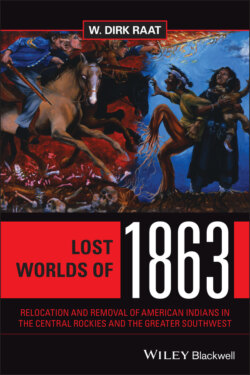Читать книгу Lost Worlds of 1863 - W. Dirk Raat - Страница 16
1 Lincoln, Free Soil and Frémont The Emancipation Proclamation and Indian Slavery
ОглавлениеThat on the first day of January, in the year of our Lord one thousand eight hundred and sixty-three, all persons held as slaves within any State or designated part of a State, the people whereof shall then be in rebellion against the United States, shall be then, thenceforward, and forever free.
From Lincoln’s Emancipation Proclamation, January 1, 1863
Free at last, Free at last, Thank God Almighty, Free at Last!
Old Negro Spiritual cited by Martin Luther King in His “I’ve Got a Dream” Speech, Lincoln Square, Washington, on the Centennial of the Emancipation Proclamation, August 28, 1963
We realize that whoever sees us, and no matter what we say to defend ourselves, the white people will think of us as dogs. We want our relatives now imprisoned at the Missouri River [Crow Creek] to remain alive. Last summer we left death behind and with no freedom to do what we wanted, we were like dead men.
Wakandhi Topa [Four Lightning] to Gen. H. H. Sibley, Camp McClellan [Davenport, Iowa], May 18, 18631
The pale-faced people [as opposed to their red brethren] are numerous and prosperous because they … depend upon the products of the earth rather than wild game for a subsistence. This is the chief reason of the difference; but there is another. Although we are now engaged in a great war between one another, we are not, as a race, so much disposed to fight and kill one another as our red brethren.
Abraham Lincoln, Meeting with Indian Leaders, March 27, 18632
On January 1, 1863, President Abraham Lincoln issued the Emancipation Proclamation. Although popular in parts of the Republican Party and in northern sections of the country where abolitionist sentiment was strong, the Proclamation was limited in scope and only one event in the long history of emancipation in the United States. For example, it did not apply to those slave states in the border area that were loyal to the Union, and did not affect those parts of the Confederacy under Union control. It did, however, transform the character of the war. One section of the Proclamation read that “I further declare … that such persons [freed slaves] will be received into the armed service of the United States to garrison forts, positions, stations, and other places, and to man vessels of all sorts in said service.”3 The liberated would become liberators, and the enlargement of the Union Army would expand the domain of freedom.
Concerning the history of emancipation, as early as 1784 Thomas Jefferson sponsored a bill in the Continental Congress that would ban slavery from expanding into the western territories (words that were later incorporated into the Northwest Ordinance of 1787 preventing slavery north of the Ohio River). The First and Second Confiscation Acts passed by Congress in 1861 and 1862 allowed Union Armies to confiscate slaves as prizes of war and banned slavery in all places where the National Government has jurisdiction.4
In another example, on August 30, 1861, Major General John C. Frémont, a recent appointee as Commander of the Department of the West, in his attempt to drive the Confederate forces from Missouri, issued a proclamation indicating that the property of secessionists would be confiscated and the slaves of rebels emancipated. By November, Lincoln had revoked Frémont’s Missouri Proclamation and relieved him from his command. Lincoln feared that Frémont’s order would push Missouri (and other border states) to the southern cause.5 Finally, after Lincoln’s death the words of Jefferson were finally incorporated into the Thirteenth Amendment to the Constitution of the United States.
While the 1863 Emancipation Proclamation remains a significant document, the question remains, why was it so silent concerning the American Indian? And, more generally, what was the Indian policy of the Great Emancipator? Certainly, he must have known about some of the traditions of Indian slavery, and that the institution of slavery dehumanized Indians as well as Afro-Americans; and what about his contemporary, the Great Pathfinder and Republican Free-Soiler John C. Frémont? If his voice rang so loudly for curtailing the expansion of slavery into the western territories, why was it rumored that he held several de facto Indian slaves and peons at his Mariposa estate in California? These and other questions will be treated in this chapter, beginning with the history of Indian slavery in the United States.
